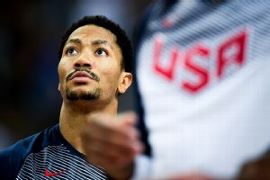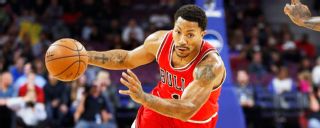|
On Aug. 1, I flipped on Team USA’s intrasquad scrimmage, a technically meaningless game intended to showcase the players competing for a roster spot for the FIBA Basketball World Cup. I was getting ready to meet a friend, and so instead of listening to the commentary, I muted the television and began playing aggressive music to prepare for the enervating hellscape otherwise known as "Manhattan." Quickly, I realized something: As a Chicago Bulls fan, this was the first time in many, many months that I was watching Derrick Rose play. I began seeking out Rose on the court and upon spotting him,focused on the way he dribbled the ball -- loosely and gracefully, as though at any minute he could begin streaking down the floor. He wasn't doing much, but he was there. Watching Derrick Rose, even for a few moments, was enough to summon a wealth of fond memories of what watching Derrick Rose was like. As the chorus of "Clarity," a beautifully stupid song by an EDM producer named Zedd, rippled out of my speakers ("Cause you are the piece of me/I wish I didn’t need"), I felt my heart crack open, and genuine emotion flowed outward. I swear a tear nearly came to my eye. This was silly; this was sports. And yet, I was transformed by the return of my favorite basketball player. Two minutes later, Paul George's leg went in a direction legs should not go, and my fuzzy moment ended. But weeks after the FIBA tournament concluded, Rose's return remains no less an emotional experience because of all the good and bad things that might come with it. There's a real sense that the Bulls' championship window continues to narrow. Their starting center will be 30 before this season ends, and his feet could already use some of that Kobe blood. The only thing that hasn't declined in the starting power forward is the quality of his Twitter. Their starting shooting guard can't shoot. More important, their presumed best player, following two disruptive knee surgeries, is one who hasn't played a full season since 2010-11 and whose delayed return to the court has provided some cause for alarm. Take Rose's shot, for example. He went 15-for-59 in FIBA play, including a ghastly 1-for-19 from 3-point range -- numbers you'd see if you queued up "NBA 2K15" and handed the controller to a 5-year-old. His brief moments of athleticism came against kiddie pool-deep competition. By the end of the tournament, he was benched as James Harden and Kyrie Irving shouldered the scoring burden. Sure, it was his first competitive play since the beginning of last season … when, it should be noted, he also didn't look so great. But with the NBA season less than a month away, the safe bet is that Rose won't be back to normal by opening night, prompting a discussion on what "normal" might be. Back in 2011, Bulls fans were willing to overlook the obvious: Rose wasn't that great of a traditional point guard. He collected a decent number of assists -- and, more important, his assists led to shots at the rim and 3-pointers -- but they came through brute force rather than pinpoint precision. He wasn't good at handling the ball the way a Chris Paul or Rajon Rondo is. Instead, he would force the defense to respond to him by being too fast and too strong, then dish the ball to the open man. You'd never marvel at a pass he threw -- as a floor general he adhered to convention, reserving his brilliance for when he was already in the air. It wasn't subversive basketball, the type that leads bloggers to pen thousand-word essays about how basketball is just like jazz, man, but it worked.  It worked because of the way Rose was able to control his body, making use of his speed to zip inside and score in any number of ways: a floater, a twisting layup, a springboard dunk. Without that athleticism, though, Rose wouldn't be able to outpace the competition and would have to rely more on his shot -- a shot that, as we've seen, is a little rusty and might never have been that great to begin with. (His best 3-point percentage before the injuries, .332 in his MVP season, would be a failure for someone like Stephen Curry.) And if you take away Rose, you take away the entire team's ability to score easy points. As we've seen the past few seasons, the Bulls aren't quite stacked with offensive facilitators. Ask someone like Kirk Hinrich or Jimmy Butler to get you a bucket and they might respond by whipping the ball off the backboard. It worked because of the way Rose was able to control his body, making use of his speed to zip inside and score in any number of ways: a floater, a twisting layup, a springboard dunk. Without that athleticism, though, Rose wouldn't be able to outpace the competition and would have to rely more on his shot -- a shot that, as we've seen, is a little rusty and might never have been that great to begin with. (His best 3-point percentage before the injuries, .332 in his MVP season, would be a failure for someone like Stephen Curry.) And if you take away Rose, you take away the entire team's ability to score easy points. As we've seen the past few seasons, the Bulls aren't quite stacked with offensive facilitators. Ask someone like Kirk Hinrich or Jimmy Butler to get you a bucket and they might respond by whipping the ball off the backboard.
Which, with the Cleveland Cavaliers back on top and the West an indefatigable fortress of contenders, would once again leave the Bulls in that death valley of "not good enough." It’s an exasperating possibility and all too familiar. Look at it cynically and it's easy to see the default stage of fandom as misery spread thinly over one's expectations -- a prolonged waiting for something good to happen when it's clear, most of the time, that nothing good will ever happen. Need a 3-pointer to tie? A touchdown to win? A home run in the bottom of the ninth to save your season? Well, good luck. But it does happen, which is why fans keep watching, and they tether their hopes to the athletes most likely to make something good happen. Michael Jordan, Walter Payton, Sammy Sosa, Frank Thomas, even Mark Prior for one, brilliant season -- Chicagoans know what it's like to watch one of those players: the type who justifies all the canned, clichéd talk about "clutch" or "wanting it more;" the type of player in whom children who don't know anything about defending the pick-and-roll place their hopes; the type of player who Derrick Rose was … and might be again. Or not. So that's what's at stake: an ascendant superstar asserting his place in the NBA's hierarchy while leading his team back to the championship picture … or a hobbled, max contract in charge of a second-round playoff exit. Charlotte Hornets fans might not mind the second round, but Chicagoans who remember where the Bulls seemed to be heading before Rose's untimely accident will only weep. Still, there's hope. Did you see the preseason game between the Bulls and the Washington Wizards last Monday night? Rose opened 4-for-5 in the first seven minutes, hit a few of those twisting layups in traffic and finished with 11 points in 14 minutes. He looked pretty good, didn't he? Even if we know better, it felt like he'd never been away. Jeremy Gordon is a staff writer for Pitchfork and contributes to The Wall Street Journal and Pacific Standard. He lives in Brooklyn. Follow him, @jeremypgordon.
|

